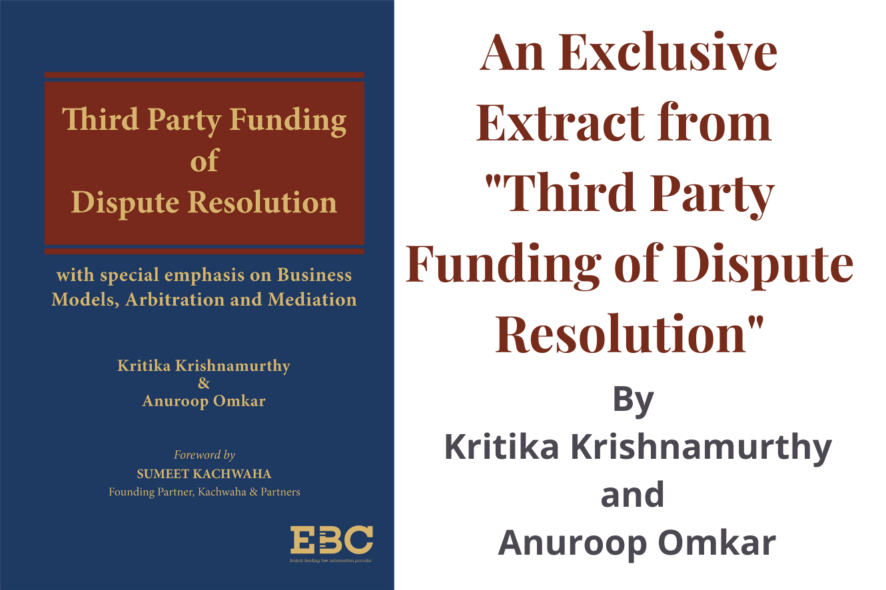About the book
This book takes a holistic approach to third-party funding in India and has something for everyone, from the practitioners and adjudicators to arbitration counsels or arbitrators engaged in an arbitration with third-party funding. For funders and claimants seeking funding, business models and foreign investment options in India, funding structures, case assessment and due diligence perspectives have been covered. For policy and lawmakers, the policy aspects of regulating or not regulating third-party funding in India from a ”to be or not to be” perspective has been taken up by the authors. Lastly, this book discusses an interdisciplinary approach of looking at third-party funding from an outside-of-law view of conflicts including neuroscience, human habits and the economic perspective of risks and costs.
The authors have tried to keep the writing style as simple and lucid as possible with relatable stories so that the reader is able to link the concepts with real life. Case studies and what-if scenarios inboxes have been included through the book as not much is available in public domain on this subject.
Author’s comments
There is no book which takes a holistic approach to third party funding in India. The present literature is stuck on a unidirectional approach of whether third-party funding is champertous. There is a need for greater scrutiny and for that there is a need for greater understanding. Third-party funding of dispute resolution involves a financial investor coming in and investing in ploughing out the receivables that are the basis of the dispute. Such financial investors are generally professional organisations who use financial modelling for cost analysis of the dispute resolution like any other commercial project in a business. Their decision to fund is based on risk analysis and due diligence again like any other business decision.
The use of third-party funding in dispute resolution can thus bring in a change in the way we perceive disputes. It also has the ability to bring in a certain level of objectivity in the evaluation of whether and how one ought to pursue a dispute resolution process which is generally lost owing to the emotional high that not just personal but business disputes bring. Evaluating the possibility of funding also has the scope of weeding out frivolous, vexatious and infructuous claims using the due diligence and cost-benefit analysis tools funders use. We have tried and summarised the various undiscussed perspectives in this book to fill this void in the information spectrum
About the Authors

Kritika Krishnamurthy
Kritika is a corporate commercial lawyer and partner at AK and Partners. She specialises in foreign investor advisory, transaction negotiation, business modelling and tax structuring. Her areas of practice include emerging technologies and regulatory tech, foreign investment in India, private equity, acquisitions, general corporate and tax (direct, indirect and international taxation). Her regulatory expertise includes banking and finance, insurance, energy, pharma, infrastructure and mining. She is a winner of Forbes Legal Powerlist Award, India Business Law Journal Future Legal Leaders Award and BW Legal World 40 under 40. She is a recipient of Dhirubhai Ambani Foundation scholarship and Maharashtra government scholarship during her graduation term. She is a fellow of UN 1325 Women in Conflict, Beyond Borders, Scotland.
Her passion projects include Bridge Policy Think Tank where she heads the research and advocacy efforts in alternative dispute resolution, mediation, ease of business for micro, small and medium enterprises and promotion of women entrepreneurs. She is a visiting faculty to Reserve Bank of India (RBI), Institute of Chartered Accountants of India (ICAI), Institute of Company Secretaries of India (ICSI) and NALSAR University of Law.
She is a commercial mediator. She is on the panel of National Company Law Tribunal (NCLT) and Appellate Tribunal (NCLAT) and World Bank. Her previous book on mediation co-authored with Anuroop is a recommended textbook on the subject by the Bar Council of India.

Anuroop Omkar
Anuroop Omkar is a lawyer and an ADR neutral. He is a partner with AK and Partners and an honorary director with Bridge Policy Think Tank. He practices general corporate with a focus in non-banking finance companies (NBFC), banking and finance, fintech, power and transmission, infrastructure, insurance, mining and telecom.
He was a nominated expert by the Ministry of Corporate Affairs, Government of India for the World Bank delegation on insolvency laws in India in London, United Kingdom. He was a special invitee to the Working Group constituted by Insolvency and Bankruptcy Board of India (IBBI). He is the member (legal) on the Monitoring Committee of Investment Education and Protection Fund (IEPFA) under the aegis of Ministry of Corporate Affairs, Government of India. He was an external consultant to World Bank on MSME RAMP project rollout.
Apart from being a lawyer, Anuroop is the first Indian ever to be nominated as a Distinguished Fellow to the International Academy of Mediators. He is on the mediator panel of the United Nations, World Bank and Asian Development Bank (ADB). He also trains professionals and students as mediators and commercial negotiators. His previous book on mediation co-authored with Kritika is a recommended textbook on the subject by the Bar Council of India.
From the Foreword
The authors have done well to string the various strands into the narrative, highlighting the myriad complexities and considerations which need to be factored in taking this forward.
I offer my compliments to the authors for their in-depth and thought-provoking work on a fresh topic having local and global interest and trust that it will be of assistance in navigating the path ahead.
—Sumeet Kachwaha
Founding Partner, Kachwaha & Partners
Exclusive extract
Although the idea of a funder for dispute resolution conjures mental images of an individual funder in a one-off litigation, the third-party funding industry across the world has grown into a network of professionally managed funds with pre-determined strategies and investment portfolio mix.[1] This is because an increasing number of jurisdictions across the world are now acknowledging the importance of monetising, resolving and creating liquidity out of realisable debts and dues stuck in dispute resolution on the asset side of the balance sheet. During our research for this chapter, we undertook research on business and funding models in jurisdictions like the UK, Australia, Hong Kong, Singapore and the US. We have also studied the funding models of few international funders such as Augusta Ventures, Burford Capital, Bentham IMF, etc. We understand that these funders always have a mix of business models as well as a mix of types of disputes in their portfolio. Accordingly, the business model adopted in each case varies considerably on the basis of type of dispute (for example, debt recovery, government receivables, private customer receivables), risk involved (on the basis of neutral evaluation of the merits of the case in favour of the disputant) and the value and nature of the receivables (big ticket, small ticket, fixed assets and intangible assets like intellectual property). Hence, third-party funding consists of a group of constantly evolving and multiplying funding methods.
Based on the models that we have studied internationally, we understand that, majorly, the third-party funders are in a way a subset of alternative investment funds in India. Further, to put it simply, the basic third-party funding arrangement usually has the following three characteristics:[2]
- funder directly contracts with the disputing party;
- disputing party remains the party to the case throughout the third-party funding arrangement; and
- the third-party funder never becomes a disputing party to the case due to which no assignment of claim or liability takes place.
From the perspective of returns, the funder may contribute risk finance in return for a percentage of what the disputing party recovers from the arbitral award, settlement or court order. This percentage of return usually ranges between 10 and 45 per cent.[3] In most countries even in the absence of a third-party funder, debt or borrowings are used by the litigant to meet the dispute resolution cost. Due to this structuring, an interest is also payable to the funder upon the actual principal amount. There is also a possibility where the litigant cleans up its balance sheet by assigning the claim completely to a third party. In such cases, internationally, the funder retains its own separate legal counsel as well as an insurance company to indemnify either the legal expenses or the underlying liability (or both),[4] or the existence of external creditors who may have a claim to amounts recovered by the winning client. Still, at its core, every funding transaction starts with three entities—a client, an attorney, and a funder.[5]
————
[1] Annual reports of third-party funders show that they are banking on creating market goodwill as an assured funding source with good due diligence abilities to spot matters best suited for legal finance.
[2] Victoria A. Shannon, “Harmonizing Third-Party Litigation Funding Regulation” (2015) 36 Cardozo L Rev 861, 863.
[3] Bernardo M. Cremades Sanz-Pastor, “Concluding remarks”, in Bernardo M. Cremades Sanz-Pastor and Antonias Dimolitsa (Eds.), Third-party Funding in International Arbitration, Vol. 10 (ICC Dossier) (Kluwer Law International, International Chamber of Commerce 2013) Chap. 12, pp. 153–56.
[4] Charles Silver, “Litigation Funding Versus Liability Insurance: What’s the Difference?” (2014) 63 Depaul L Rev 617, 618.
[5] Victoria Sahani, “Reshaping Third-Party Funding” (2017) 91 Tul L Rev 405.
1. What is Third-Party Funding?
2. Business Models and Structuring of Third-Party Funding
3. International Perspective on Issues Specific to Arbitration
4. Issues Specific to Arbitration in India
5. Issues Specific to Mediation
6. Issues Related to Insolvency
7. Policy Perspective
8. Interdisciplinary View of Third-Party Funding of Dispute Resolution
Subject Index
A copy of the book can be bought here: https://www.ebcwebstore.com/product_info.php?products_id=99101844






